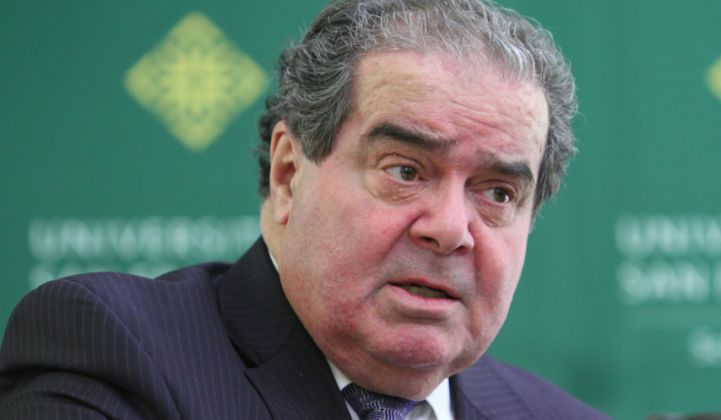Supreme Court Justice Antonin Scalia passed away this weekend at age 79.
Despite the conservative Scalia's imprint on the court over the last 30 years, his historic impact may be due more to the timing of his death than to his above-ground exploits.
Scalia's death is another act in the Clean Power Plan legal drama (as well as the 2016 presidential election). Here's a quick refresher.
- As GTM's Julia Pyper reported, the Clean Power Plan, President Obama's landmark regulation to cut emissions from stationary polluters, was issued a surprise stay by the U.S. Supreme Court late last week.
- A number of states, utilities and fossil fuel companies had requested to block the CPP, making assertions of irreparable harm, even in these early planning stages.
- The stay was a black eye for the Obama administration, which finalized historic carbon regulations on new and existing power plants last August. The rule seeks to cut pollution from the power sector by 32 percent by 2030 and spur investments in clean energy.
- The 5-4 vote (PDF) had the justices voting along ideological lines, with Justices Ginsburg, Breyer, Sotomayor and Kagan losing to the five conservative Justices -- Roberts, Scalia, Kennedy, Alito and Thomas.
As Pyper reported, "The stay is expected to last through much of the year, until the U.S. Court of Appeals for the District of Columbia Circuit makes a final ruling on the plan. A decision in that case is expected in late 2016 or early 2017. Regardless of the outcome, the decision is likely to be appealed by either foes or proponents, and sent to the Supreme Court for a full merit review."
That 5-4 vote sent "a worrying signal to the EPA on how the high court could ultimately rule."
But now, providing none of the other septuagenarians and octogenarians on the court meet their maker this year, and providing Obama cannot get a new justice not named Bork confirmed, the Supremes would stand locked at 4-4 in 2016.
And as Robin Bravender and Jeremy Jacobs at E&E Publishing point out: "If the justices split 4-4 on a case -- as they're likely to do if they divide along ideological lines -- the court simply upholds the decision of a lower court without setting new precedent."
Which means that the three-judge panel of the DC Circuit Court now hearing the case, and reportedly "sympathetic" to environmental issues, will decide on the fate of the CPP. That panel includes Sri Srinivasan, an Obama appointee and someone mentioned as a potential, already vetted, nominee for the vacant Scalia seat.
In the meantime, the DC Circuit Court could potentially throw out the stay on the CPP, The Washington Post reports: "Now the Obama administration can simply have the Environmental Protection Agency come up with a slightly different new plan and run to the liberal D.C. courts to bless it and refuse to stay it. It’s unlikely the now-divided Supreme Court would come up with a majority to stay the new rules: The vote to stay the old ones was (naturally) 5 to 4."
Obama will be out of office by the time this legal battle is over, leaving his successor, President Trump, Cruz, Rubio, Bush, West, Clinton or Sanders to scrap or shepherd the Clean Power Plan. But for today, Obama's plan to address climate change is in better shape than it was last week.
***
"Certainly the Constitution does not require discrimination on the basis of sex. The only issue is whether it prohibits it. It doesn't. Nobody ever thought that that's what it meant. Nobody ever voted for that. If the current society wants to outlaw discrimination by sex, hey, we have things called legislatures, and they enact things called laws. You don't need a constitution to keep things up-to-date. All you need is a legislature and a ballot box. You don't like the death penalty anymore, that's fine. You want a right to abortion? There's nothing in the Constitution about that. But that doesn't mean you cannot prohibit it. Persuade your fellow citizens it's a good idea and pass a law. That's what democracy is all about. It's not about nine superannuated judges who have been there too long, imposing these demands on society." – Justice Scalia from May 2011, California Lawyer magazine interview



